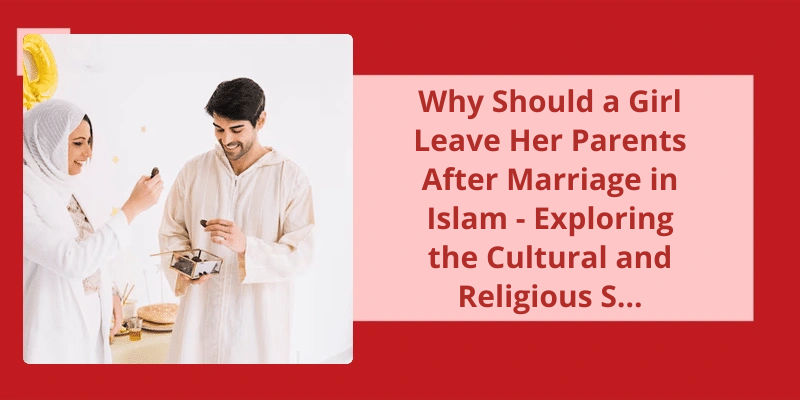Islam, being a religion of peace, equality, and justice, offers guidelines for every aspect of life, including marriage. In Islam, marriage is regarded as one of the most sacred and significant sacraments of life. It’s a bond that’s to be nurtured and cherished by the spouses involved, keeping in mind the principles and guidelines provided in the Quran and Sunnah. One such guideline that’s often debated and discussed is the concept of a girl leaving her parents after marriage. Islam promotes respect, care, and love for parents and emphasizes the importance of maintaining strong family ties. However, it also recognizes the significance of marital life and the responsibilities that come along with it. Hence, it’s laid down certain guidelines that help to strike a balance between the rights and responsibilities of both parents and partners. This article will explore why a girl should leave her parents after marriage in Islam.
Should Newly Married Couple Live Separately From Their Parents in Islam?
This is mainly because each individual has a right to their own privacy and space, which may not be fully achieved while living with parents. Furthermore, living separately allows newly married couples to establish their own household and build their relationship without interference or influence from other family members.
Living with parents also raises the potential for conflicts, especially if there are differences in values and beliefs. These conflicts can negatively impact the relationship between the couple or even between the couple and their parents. Conversely, living independently may provide a more peaceful and harmonious home environment where both partners can grow together.
Another important factor to consider is that newly married couples have a responsibility to plan for their future and establish a stable and secure household.
It should also be noted that while Islam encourages living apart from parents, it doesn’t mean that respect and care for parents is diminished. In fact, respecting and honoring parents is one of the most important teachings in Islam. Living separately from them doesn’t negate this obligation, but rather allows for a stronger and more respectful relationship where boundaries are respected, and both parties can still maintain their independence.
Finally, while individual circumstances may vary, it’s important for couples to communicate openly and honestly with their parents about their decision to move out. It’s recommended that couples approach the situation with kindness and compassion, recognizing the important role parents have played in their lives and the value they hold in Islam. A peaceful and respectful conversation that emphasizes the desire for personal growth and independence can go a long way in maintaining a healthy and loving relationship with parents.
The Cultural and Societal Pressures Surrounding Living With Parents After Marriage in Muslim Countries
- The cultural expectation that adult children live with their parents after marriage
- The societal pressure to conform to this expectation and the potential consequences of not doing so
- The financial considerations for couples who do decide to live with parents, including saving money on rent and household expenses
- The challenges and conflicts that can arise when living in a multi-generational household, including differences in values, expectations, and lifestyle choices
- The ways in which gender roles and expectations may be reinforced or challenged by living with parents after marriage
- The impact of modernization and globalization on these cultural and societal pressures, and the ways in which younger generations may be challenging traditional expectations
The significance of a mother in Islam can’t be overstated as the religion recognizes and honors the efforts and sacrifices that a mother makes in raising her children. It’s believed that a mother’s role is critical in shaping a child’s life, and that their efforts don’t go unnoticed by God. Furthermore, Islam places great importance on taking care of one’s mother and being good to her as a means of attaining Paradise in the after-life.
How Important Is Your Mother in Islam?
A mother is considered as one of the most important figure in the Islamic faith. The religion gives utmost respect to mothers and highlights the significance of their role in the upbringing of children. Mothers are the ones who carry their children in their wombs for nine months, give birth, and endure all the pain and hardships to ensure the childs survival. In the Holy Quran, there are several verses that emphasize the importance of treating mothers with kindness and respect.
Islam also recognizes the difficulty and sacrifices that mothers make for their children. Therefore, it’s considered a moral obligation for children to repay their mothers kindness and love. This includes taking care of them financially, physically, and emotionally in their old age. It’s said that a mothers dua (prayer) is a powerful tool that can benefit her children even in their after-life. Therefore, it’s essential to keep a good relationship with the mother and seek her blessings.
Moving on to the topic at hand, let’s delve into the intricacies of living with your parents after getting married. It’s a decision that many couples make for various reasons, but it’s important to have an open and honest conversation with all parties involved to ensure a smooth transition.
Is It Normal to Live With Your Parents After Marriage?
Living with your parents after getting married can be a cultural norm for some families. In some countries, it’s customary for the newly married couple to live with the grooms parents for a period of time before moving out on their own. This can be seen as a sign of respect for the elders in the family and a way to continue the family lineage.
However, in other cultures, it’s more common for the newly married couple to move out and start their own household. This can be seen as a sign of independence and the beginning of their own family unit. It all depends on the traditions and beliefs of the families involved.
For example, if you’re struggling financially, living with your parents can help save money on rent and other living expenses. It can also be helpful if you’ve young children and need extra help with childcare.
It’s important to consider the dynamics of the household before making a decision to live with your parents after getting married. Will there be enough space for everyone? Will you’ve privacy and independence as a couple? It’s crucial to have open and honest conversations with both your spouse and your parents before making a decision.
There’s no right or wrong answer, as long as it works for all parties involved. It’s important to prioritize open communication and mutual respect in order to make the living arrangement successful.
How to Navigate Cultural Differences Surrounding Living Arrangements After Marriage
- Be respectful of each other’s cultural norms and preferences
- Communicate openly and honestly about your expectations for living arrangements
- Consider compromising and finding a middle ground that works for both of you
- Seek guidance from a cultural advisor or therapist if needed
- Remember that compromises may need to be made throughout your marriage as cultural differences arise
- Be willing to learn and understand more about each other’s cultures to foster a deeper connection and understanding
Living a fulfilling and happy married life is a crucial part of Islam. A marriage built on love, respect, and mutual understanding can bring ultimate contentment and success both in this world and the hereafter. In this article, we will delve deeper into the Islamic perspective of maintaining a healthy marriage and discuss practical ways to keep the relationship strong and flourishing. From spending time together to exploring common interests and praying together, we explore various ways to keep the love and passion alive in your marriage. Let’s dive in and discover how to lead a successful married life according to Islam.
How to Live Married Life According to Islam?
Living married life according to Islam means living a disciplined life where mutual respect and understanding are core values. Marriage in Islam isn’t just a social bond, it’s a sacred contract between two individuals who commit to love, cherish, and respect each other. Maintaining a healthy marriage in Islam requires nurturing the emotional, spiritual, and physical aspects of the relationship.
One way to maintain a healthy marriage is by spending quality time together. This includes taking time out of busy schedules to go on dates, talk, and bond with each other. Communication is vital in any marriage, and partners should prioritize each other’s presence in their daily lives.
When conflicts arise, it’s essential to negotiate in a way that shows mutual respect and understanding. In Islam, there’s emphasis on forgiveness and the ability to let go of personal grievances. It’s also important to acknowledge each others differences and work towards a common ground.
Respect is the cornerstone of a successful marriage according to Islamic teachings. This means valuing each others opinions, feelings, and needs. In Islam, spouses are seen as garments for each other, meaning they protect, adorn, and beautify each other.
Taking care of oneself in a marriage is equally important as taking care of the relationship. A happy, confident, and fulfilled individual can contribute positively to the marriage. Thus, in Islam, personal growth and self-care are highly valued.
Emotional intimacy is a crucial aspect of a healthy marriage. In Islam, spouses are encouraged to express their love and appreciate each others qualities. Couples should be open to sharing their thoughts, emotions, and deepest desires with each other. This helps to foster a more profound connection, leading to a stronger marriage.
In Islam, couples are encouraged to explore common interests as a way of bonding and nurturing their relationship. This could be as simple as shared hobbies or deeper beliefs and values. It’s essential to have mutual goals and aspirations in a marriage.
Prayer is an important aspect of the Islamic faith, and when practiced together by spouses, it can lead to a deeper connection with each other and with Allah. Sharing spiritual experiences can strengthen the bond between partners and lead to a more profound understanding of each other.
By following these principles, couples can build a strong and fruitful marriage that’s blessed by Allah.
Conclusion
In Islam, marriage is considered to be a union not just between two individuals, but between two families. While it’s important to maintain a strong and loving relationship with family, a girl must also prioritize her husband and his family after marriage. This isn’t only a cultural tradition, but a religious obligation that’s based on the principles of respect and responsibility. By leaving her parents and starting a new life with her husband, a girl is fulfilling her duty as a wife and a member of the Muslim community. Ultimately, this decision is a personal one that should be made with careful consideration and guidance from religious and cultural leaders.






